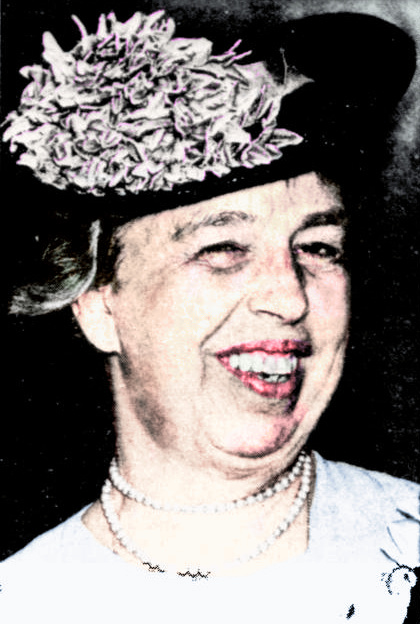
MY DAY
By Eleanor Roosevelt
October 1, 1941
New York, Tuesday –
Yesterday, I finally succeeded in seeing all the heads of departments who are under my direction in the Office of Civilian Defense, except Mr. Kelly, who is in charge of physical education for defense, and who apparently functions in Philadelphia. I have not yet had an opportunity to catch up with him, but his assistant, Miss Alice Marble, who functions in New York City, has telegraphed me that she is coming down to see me soon.
We caught the 6:00 plane for New York City and worked on my personal mail during an extremely smooth flight. I went home first, where I had a glimpse of Jimmy and Rommie, who were just starting out in their best bibs and tuckers to dine very gaily in celebration of her birthday, and to listen to the fight.
I must confess that I would rather listen to the fight over the radio than actually see it, and I prefer not having even to listen to it! This is heresy, I suppose, but I was never really educated in sports.
Miss Thompson and I dined in a little restaurant on 60th Street near 5th Ave., which we both like, and had a very leisurely and pleasant meal by ourselves.
Today, from 10:00 to 4:30, I am meeting with the regional directors of the Federal Security Agency, and hope to discover where they need volunteer services in their various programs. When we return to Washington this evening, I hope to have a very clear picture of some of the opportunities for work which we can develop.
Volunteers and jobseekers are already beginning to crowd Miss Dorothy Overlock’s office in our headquarters in Washington. Miss Overlock is Mrs. Ernest Lindley’s assistant and is interviewing people until Mrs. Lindley is able to return to Washington for the winter. This work is most important, for they must guide people into channels where they will find satisfactory work.
Between 4:30 and 5:00 this afternoon, I am going to stop in at a meeting of the Defense Knitting for Citizens Committee for the Army and Navy. My friend, Mrs. June Hamilton Rhodes, seems to have organized nearly all the department stores and all the knitters in the whole city. I am sure that none of our boys will be without knitted woolen garments to meet the inclemencies of the winter weather.
Mrs. Rhodes is a dynamic person. If she has decided that we are going to knit, we are not only going to knit, but we shall produce garments which our boys can wear, for she will not tolerate waste and she will see that we are efficient!